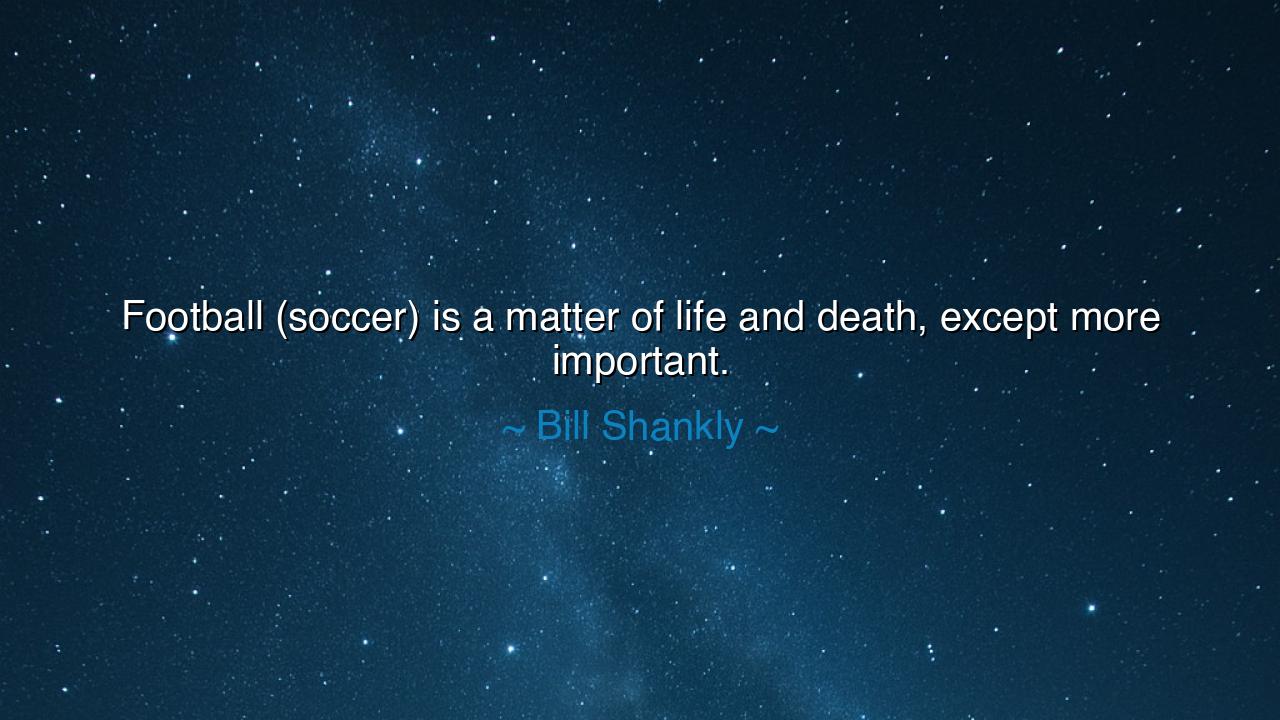
Football (soccer) is a matter of life and death, except more






When Bill Shankly, the great Scottish manager of Liverpool, declared, “Football (soccer) is a matter of life and death, except more important,” he was not speaking in jest, though his words sparkle with wit. He spoke as one who understood the fire that burns in the heart of those who love, strive, and give everything to a cause greater than themselves. In those few words lies the soul of the game—not merely a sport of grass and goals, but a reflection of human spirit, of passion, of sacrifice. His words echo across generations, like a hymn to dedication itself.
Shankly was no philosopher cloistered in a library, but a man forged in the cold winds of Ayrshire, tempered by labor and hardship. He rose from the coal mines to the roaring terraces, carrying with him the knowledge that for the working man, football was not escape—it was identity. In those times, when wages were meager and life uncertain, Saturday afternoons brought purpose, communion, and pride. To Shankly and millions like him, football was not about leisure; it was about belonging, about standing shoulder to shoulder and shouting the same dream into the sky.
When he said it was “more important than life and death,” he meant that within the simple struggle of the game—the chase of a ball, the roar of the crowd—lay the very essence of what makes life worth living: commitment, struggle, and hope. For what is life without passion? What is breath without purpose? The ancients had their battles, their arenas where men fought for glory and honor; Shankly’s arena was the pitch, where courage, loyalty, and teamwork were tested not by the sword, but by the will to endure, to strive, to rise again after defeat.
In this, Shankly stands among the great teachers of perseverance. Like the Spartan who would rather die than abandon his shield, the player under Shankly’s charge was taught that to give less than one’s all was unworthy of the spirit. “Football is life,” he would say, not because the game replaced existence, but because it mirrored it. Every goal was a triumph of faith; every loss, a lesson in humility. To those who listened, he gave more than tactics—he gave philosophy: that discipline, teamwork, and love of the craft are the highest forms of devotion.
History offers us its echoes of this same truth. Think of Pelé, the boy from the slums of Brazil, who played barefoot with a ball made of rags, and yet carried his nation’s dreams upon his young shoulders. For him, as for Shankly, football was no pastime—it was destiny, a bridge from poverty to immortality. Every match he played was a prayer, every goal a proof that greatness can be born from the humblest beginnings. Through him, and through countless others who played not for gold but for glory, Shankly’s words come alive: that the game holds something eternal, something that outlives both victory and defeat.
But there is also warning in Shankly’s fire. For passion, if left untamed, can become obsession. To love something deeply is noble; to let it consume all else is perilous. The wise understand that what he meant was not to forsake life for football, but to live life with the same fervor one brings to football—to treat every endeavor, every relationship, every dream with that same sense of urgency, that same refusal to be indifferent. For in truth, Shankly was not preaching about sport; he was preaching about purpose.
Thus, the lesson we take is clear: to live without passion is to half-live, to drift through days as a spectator rather than a participant. Whatever your craft, your calling, your dream—tend to it as Shankly tended to football. Wake each morning ready to give your best, and if you fail, rise again with stronger will. See in your work not mere duty, but the heartbeat of something divine, something worth your full devotion.
So, to those who listen to this teaching, let it stir your spirit: live as Shankly coached, with courage, with unity, with love for the fight itself. Whether your field is grass or stone, whether your goal is art, justice, or truth, let your passion be your anthem. For in the end, life and death pass away—but the flame of purpose, once lit, burns forever. And that, indeed, is more important.






AAdministratorAdministrator
Welcome, honored guests. Please leave a comment, we will respond soon